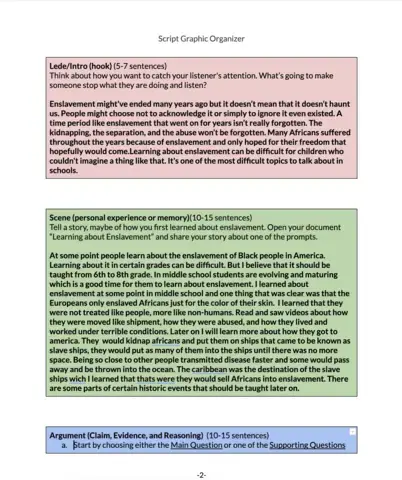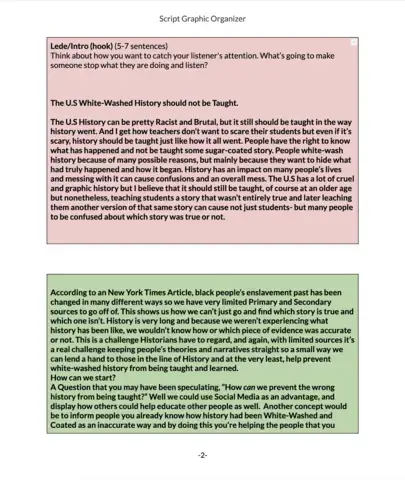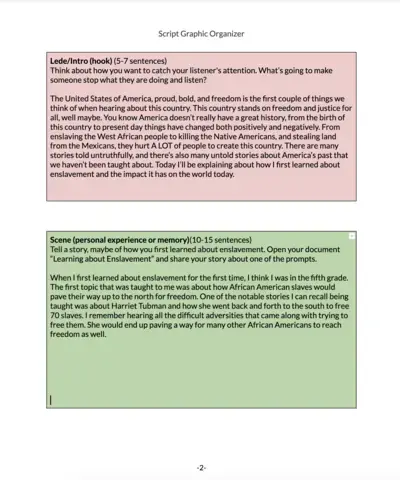This unit was created by high school educators from the Fremont Tigers team, part of the 2022 cohort of The 1619 Project Education Network. It is designed for facilitation across approximately 5-6 weeks, or 20 60-80 minute class periods.
Essential Questions
Compelling Question
How should the history of enslavement be taught?
Supporting Questions
- How does teaching and learning about African American history change if you begin with cultural ancestors in the African continent vs. the Middle Passage?
- How does the teaching and learning about slavery change if you focus on the institution of slavery vs. the fight of the enslaved for freedom?
- Why do we try to avoid the violent parts of our country's history? What is the best way to teach and acknowledge those violent parts?
Unit Objectives
- I can analyze secondary sources to understand how historians have taught enslavement or avoided the topic.
- I can engage in collaborative discussions with my peers that help deepen my understanding of how enslavement is taught and reflect on my learning experiences.
- I can craft an argument using evidence that answers the selected prompt.
Unit Overview
This unit has four parts:
- Enslavement in America: Prior Knowledge Check (Days 1-3)
- Contextualizing Enslavement in the Atlantic World (Days 4-12)
- How Should Enslavement Be Taught: A Structured Academic Controversy Protocol (13-15)
- Performance Task: Podcast Analysis and Creation (Days 16-20).
In this unit, students critically reflect on how they learned about enslavement, analyze enslavement systems in the Atlantic World, engage in academic discussions using primary and secondary sources, and produce a podcast script that demonstrates strong persuasive commentary.
During part one, students critically reflect on how they learned about enslavement going back to their early educational experiences to understand what they know and how they were taught about enslavement.
In the second part, students learn about slavery in the Atlantic World, which connects Africa, the Americas, and Europe. Students compare elements of enslavement systems by looking at forms of servitude and unfreedom in the Americas and enslavement as a world system.
In the third part, students utilize rich primary and secondary sources from the 1930s to the present to engage in an academic discussion on how enslavement has been and should be taught in school. Students analyze six sources and develop an argument about how the history of enslavement should be taught.
In the summative performance task, students will use their discussion to write a script for a podcast episode in which they support their argument. Students will analyze 1619 podcast episodes as a scaffold to support their scripting. Using intentional language and the importance of explicit naming, students will write a script using the Persuasive Commentary Script template provided in resources.
Performance Tasks
Podcasts can reach a broad audience and make an argument shortly and succinctly. Students will have the opportunity to practice their argumentative skills through a persuasive commentary incorporating a claim supported by evidence that is also deeply personal and reflective. The podcast will showcase students’ products to a wider audience and impact how teachers approach and teach about enslavement.
Sustained inquiry:
- Content Critique / Teachers support students in questioning the dominant discourses and power dynamics in their disciplinary context and encourage students to offer and seek out counternarratives when necessary.
- Explicit Naming / Teacher supports students in explicitly naming how power, white supremacy, racism, patriarchy, and other oppressions may manifest within school policies, culture, and curricula.
Five-six week World History unit plan for teachers, including texts and multimedia resources, graphic organizers, and performance tasks. Download below, or scroll down to read the complete unit plan.
Facilitation Resources
| Resources from The 1619 Project | "The Idea of America" by Nikole Hannah- Jones: The essay at the cornerstone of The 1619 Project, exploring the contributions of Black Americans in moving America towards its stated democratic ideals. “Mass Incarceration” by Bryan Stevenson: An essay about how the criminal justice system is defined by two key legacies of slavery in the United States: a fear of Black people and a taste for violent punishment. Podcast Episode 1: "The Fight for True Democracy" Podcast Episode 2: "The Economy That Slavery Built" Podcast Episode 3: "The Birth of American Music" |
| Resources for Structured Controversy Protocol | Rachel L. Swarns, “The Search for a Meaningful Clue to the Mystery of an Enslaved Ancestor,” The New York Times, August 6, 2022. Nikita Stewart, “‘We are committing educational malpractice’: Why slavery is mistaught — and worse — in American schools,” The 1619 Project, New York Times (2019). Stephanie P. Jones, “Ending Curriculum Violence,” Learning for Justice (2020). K.C.B ., “A Student’s Take on Sugar-coated History,” Learning for Justice (2022). Carter G. Woodson, “Preface,” in The Mis-Education of the Negro (1933). W.E.B. Du Bois, “The Propaganda of History,” in Black Reconstruction (1935). |
| Informational Videos | The Forgotten Slavery of Our Ancestors Learning For Justice (2021) “The African Americans: Many Rivers to Cross” Episode 1: “The Black Atlantic” PBS (2013) |
College, Career, and Civics C3 Framework for Social Studies Standards
D2.His.6.9-12. Analyze the ways in which the perspectives of those writing history shaped the history that they produced.
Common Core Standards for English Language Arts 9-10
Writing 9-10.1. Write arguments to support claims in an analysis of substantive topics or texts using valid reasoning and relevant and sufficient evidence.
Speaking Listening.9-10.1 Initiate and participate effectively in a range of collaborative discussions (one-on-one, in groups, and teacher-led) with diverse partners on grades 9-10 topics, texts, and issues, building on others' ideas and expressing their own clearly and persuasively.
This unit was implemented with 10th Grade World History students. Students are still in the proccess of recording their podcast episodes for the performance task but some sample student scripts are provided below. This page will be updated once student podcast episodes are available.
Performance Tasks
Podcasts can reach a broad audience and make an argument shortly and succinctly. Students will have the opportunity to practice their argumentative skills through a persuasive commentary incorporating a claim supported by evidence that is also deeply personal and reflective. The podcast will showcase students’ products to a wider audience and impact how teachers approach and teach about enslavement.
Sample Podcast Introductions



